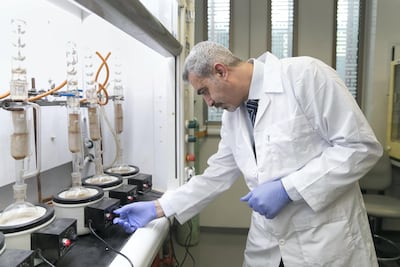A research team in the UAE have extracted a large quantity of biofuel from date seeds, signalling a huge potential boost for the country’s biofuel industry.
About one million tonnes of date seeds are produced from 40 million palm trees in the Emirates, 10 per cent of which can be extracted as oils. This will help create 100,000 tonnes of oils that can converted into biofuel.
The Dh1 million project was carried out by researchers at UAE University in Al Ain over two years. The findings have been published in widely read journals including Green and Sustainable Chemistry.
Biodiesel is often thought of as being environmentally friendly because it releases carbon recently removed from the atmosphere. It has recently picked up demand, particularly in the aviation sector to make transport more environmentally friendly.

Aviation is expected to account for 3.5 per cent global energy-related carbon dioxide emissions by 2030, the International Energy Agency said.
As of last year, more than 150,000 flights had used biofuels since the first flight using blended biofuel took off in 2008.
The UAEU researchers extracted date pits from the popular khalas date variety, cleaned them, then sun-dried them for two days before grinding and sieving them. A solvent extracted the oil, with the yield relative to the weight of the pits reaching as high as 11.7 per cent.
As well as looking at how much oil they could extract from date pits, the researchers were also interested in the gases produced by burning them.
By using the pyrolysis process – a method used to heat organic materials to extract combustible gases such as hydrogen, methane and carbon monoxide, as well as charcoal – they were able to use 100 per cent of the waste created by the date seeds.
Among the potentially useful gases they recorded were methane, a gas that is burnt to produce electricity, and hydrogen, which is being used to fuel cars.
Dr Emad Elnajjar, associate professor in the university’s mechanical engineering department, said the findings would help reduce waste and increase the use of sustainable energy.
About 900,000 tonnes of waste can be used in gaseous pyrolysis and the remaining is beneficial for other applications, particularly as fertiliser in agriculture.


